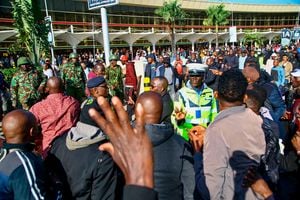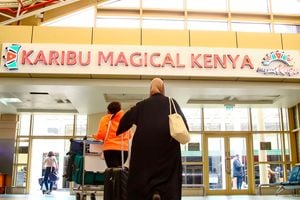
Indian tycoon Gautam Adani. Inset is President William Ruto, former Transport CS Kipchumba Murkomen and current Transport CS Davis Chirchir.
On July 28, at a town hall meeting in Mombasa following the highly charged Generation Z-led protests against his government, President William Ruto stated that only a “mad man” would sell a national asset of the stature of the Jomo Kenyatta International Airport (JKIA).
The President was seeking to ease public fears after it emerged that India’s Adani Group was in the process of signing a deal to run JKIA for up to three decades.
The Head of State termed Kenya’s biggest airport a “strategic national asset” at a time when social media was awash with reports that the government was “selling” JKIA to the Indian conglomerate.
“I have seen many people saying William Ruto wants to sell the airport. Am I a mad man? How do you sell a strategic national asset? You have to be insane,” said the President.
Instead, the President argued that it was only a lease, and without naming Adani or any other investor, added that the private capital from the lease would help Kenya catch up with its regional competitors who are building new airports with larger passenger capacities.
“I am also doing something about the airport (JKIA). Let’s be honest, Kenyans, the airport we have in Nairobi is made of canvas. Ethiopia and Rwanda have brand new airports. This is the reason why we need to work with investors to give us a new airport in Nairobi,” said President Ruto.
Nearly two months later, Adani’s proposal for a $2 billion (Sh258 billion), 30-year JKIA concession agreement has become a political hot potato, especially after details emerged that the government has also lined up five additional multi-billion-shilling deals for Adani in the energy sector.
Some of the questions that have emerged include how the government did not open the JKIA lease tender for competitive bidding, quickly settling on Adani’s privately-initiated offer.
Newly appointed Transport Cabinet Secretary Davis Chirchir has also failed to answer the Senate on why a similar privately-initiated offer filed three months ago by Corporacion American Airports SA, one of the world’s biggest airport operators, went un-answered.
The secretive transactions have thrust the spotlight on the top officials who were in charge of the ministries under which the Adani deals are being procured, amid fears of huge losses top taxpayers in the apparently hurried processes.
Kenya Airports Authority (KAA), which draws its giant share of revenue from JKIA, had been one of the most profitable state corporations before it ran into financial troubles in recent years over cancellation of yet another proposal to build a greenfield terminal project.
The parastatal sank into a Sh4.2 billion net loss for the year to June 2023, having posted a net profit of Sh43.3 million in the previous financial year.
The loss was caused by payments of Sh5.4 billion in damages and interest to a Chinese firm for the botched tender for construction of a second terminal at JKIA.
A Senate investigation last week revealed that concerns raised at a June board meeting by KAA, the procuring entity for the Adani-JKIA deal, were ignored.
“It was noted that the project has attracted interest from the government and it is difficult to continue in its execution,” reads the KAA Board’s minutes for the meeting that were presented to the Senate.
It also emerged that contrary to the narrative by State officials that Adani’s offer is the only one on the table, Argentinian firm Corporación América Airports expressed interest in operating Kenyan airports in June.

Stranded travellers await clearance at JKIA Terminal 1A with Kenya Aviation Workers on strike on September 11, 2024.
The firm, according to the report, is yet to receive a response from the government.
Sports Cabinet Secretary Kipchumba Murkomen, who served as the Roads and Transport CS when the Adani deal was brokered, did not respond to our questions on the controversial Adani deal.
Davis Chirchir, who took over as the Roads and Transport CS from Mr Murkomen last month and appeared before the Senate last week to defend Adani’s JKIA takeover, also did not respond to questions sent to his known mobile number. CS Chirchir was the Energy CS when the Adani deals in the Ministry of Energy were initiated.
Despite President Ruto’s acknowledgment of JKIA as a strategic national asset, questions over its intended lease in an opaque, single-sourced process have remained unanswered.
“There are ministries under whose dockets those projects fall. It would be prudent to direct your questions to the respective ministries,” said State House Spokesperson Hussein Mohamed in response to Nation queries.
JKIA is the main point of entry for international travelers into Kenya.
Critics have argued that the lease of JKIA is not an emergency, raising eyebrows over the rapid speed at which the government is pushing through the deal even before public participation is conducted in line with the law.
But amid the furor surrounding Adani’s proposed takeover of JKIA, the government is also negotiating with the same firm on four separate deals in the energy sector.
The Kenya Electricity Transmission Company (Ketraco) on Monday kicked off public participation on the deals that, if approved, will see Adani Energy Solutions Limited, a subsidiary of the Adani Group, build three high-voltage power transmission lines and two substations.
According to information revealed by Ketraco, Adani initially submitted its privately-initiated proposals (PIP) to build the power lines last year under the tenure of Mr Chirchir, who was then serving as the Cabinet Secretary for Energy and Petroleum.
The Adani Group, which was founded by billionaire Gautam Adani, is not new to controversy. It has been accused of bribery, environmental pollution and tax evasion in Australia.
“Adani uses dodgy tax havens in the Cayman Islands to hide assets and revenue. 13 of the 26 Adani subsidiaries registered in Australia are ultimately owned in the Cayman Islands. Companies who pay their taxes don’t register themselves in the Cayman Islands,” said a report released by the Australian Parliament titled The Adani Files: A short history of corruption, destruction and criminal activity.
Swiss authorities last week also froze more than $310 million held in multiple bank accounts linked to Adani over allegations of fraud.

Stranded travellers read novels as they await clearance at JKIA Terminal 1C following a strike by Kenya Aviation Workers on September 11, 2024.
These concerns over the integrity of Adani and its possible impact on Kenya have elicited strong resistance from various interest groups including airport workers, who fear being replaced should the deal sail through.
The deal has also been put on hold by the High Court. Earlier this month, the High Court temporarily stopped the lease of the JKIA to Adani by KAA pending the hearing of a case filed by the Law Society of Kenya (LSK) and the Kenya Human Rights Commission (KHRC) opposing the deal.
But State officials continue to defend Adani, including its capacity and expertise in the projects that it is seeking to develop in Kenya.
Energy and Petroleum Cabinet Secretary Opiyo Wandayi on Monday defended the Adani power lines deal, stating that the firm has already built cumulative transmission network of 21,783 kilometres of power transmission lines and 61,686MVA of transformation capacity.
“They privately own more energy infrastructure than Kenya, Uganda and Tanzania combined,” said CS Wandayi.
The CS said the government has already done documentary review as part of its due diligence on Adani and that this will be further verified through a scheduled physical visit to its projects.
“The (Adani) projects are critical towards ensuring grid stability and adequacy through the 400kV backbone in addition to reinforcement of existing aged systems for improved efficiencies with regards power transmission and evacuation of renewable energy-based power,” said CS Wandayi.
Adani is set to build the 206km, 400kV Gilgil-Thika-Malaa-Konza power transmission line that seeks to improve the security of power supply around Nairobi. The line is expected to be completed in 2027.
It will also build the 70km 132kV Menengai-Olkalou-Rumuruti transmission line that will extend high voltage to Olkalou, providing an alternative evacuation path for the Menengai geothermal complex. The line is slated for completion in 2028.
The firm will also construct the 99km, 220kV Rongai-Keringet-Chemosit transmission line and associated substations.
Further, Adani will construct two substations namely the 132kV Thurdiburo substation slated to be built by 2028 and the 400/220/132kV substation at Rongai, whose completion is also targeted for 2028.









